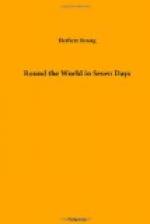He drew clear of the squadron, and was about to put his engine at full speed again when an aeroplane shot up from the deck of the flagship and started in pursuit, followed at a short interval by a second aeroplane from a vessel some distance down the line. Smith smiled to himself. From what he knew of the service aeroplanes, the Puck, as he had now named his vessel, was in no danger of being overtaken; but if the airmen of the Red fleet wanted a run, he was not the man to baulk them. In a few minutes the pursuers began to close in; he increased the speed to eighty miles; still they gained on him. Another notch in the regulator increased his speed to a hundred miles an hour, at which he felt that he should be able to hold his own. He found, however, that one of the aeroplanes was still gaining, and it was not until he had increased his speed another twenty miles that the Puck began to draw away.
“Now to business,” Smith said to himself.
Paying no more attention to the pursuers, except by a glance to assure himself that, though hopelessly outstripped, they were still following him, he searched the horizon ahead for signs of the Blue fleet. The rugged coast of Cork county had been for some time in sight, and as Smith was well acquainted with it from experience in former manoeuvres, he was able to steer straight for Bear Haven as soon as the landmarks were distinguishable. It was more than half-an-hour after sighting the Red fleet when he flew over Bantry Bay to the harbour. Except for a number of colliers it was empty.
Smith had already decided on his course of action if he should find that the fleet had put to sea. He would adopt the tactics that had succeeded so well in Ysabel Island, searching, not the land this time, but the sea, fanwise, while his fuel lasted. The position of the colliers seemed to indicate that they had only recently been engaged in coaling, so that in all probability the fleet had left that morning and was not far away. Probably, too, it was in the open Atlantic, and not sheltering in any of the innumerable inlets of the western coast. He steered due west, noticing as he did so that the pursuers were still doggedly on his trail, and had gained considerably while he had been investigating the harbour.
He looked at his watch. It was twenty-five minutes to nine. He would reach his ship in time if it were not more than eighty-five miles distant, supposing that it was going in the same direction, or perhaps a hundred and ten if it were coming towards him. Rising to the height of 4,000 feet, he searched the sea in all directions through his binocular. He noticed with amusement that one of the pursuing aeroplanes had come down on Mizzen Head; the other was still labouring after him. There were fishing smacks here and there near the coast, looking like moths. Far to the left he saw a liner pouring its black smoke into the air; it might have been a cockroach in widow’s weeds. And there,




